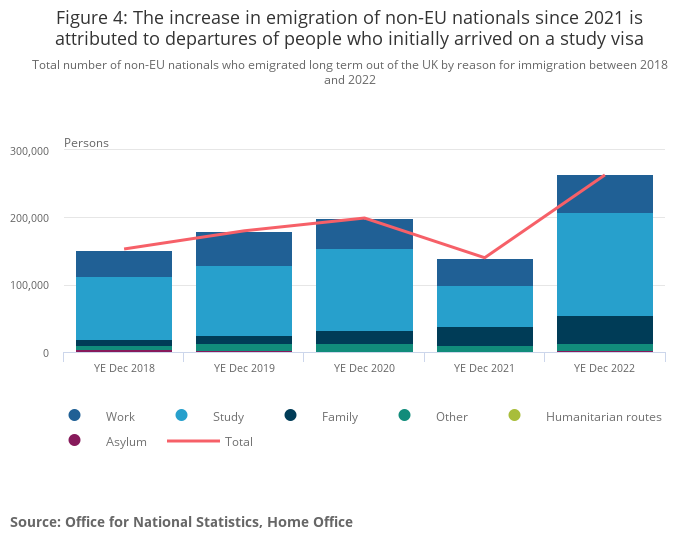Non-EU international students have driven a rise in emigration out of the UK while the number of students bringing dependants doubled in 2022, according to new data from the Office for National Statistics.
News and business analysis for Professionals in International Education
Have some pie!
Departing students add to UK emigration as dependants double
 Data suggests the students who arrived in 2021 after lockdown restrictions were lifted are beginning to leave. Photo: Pexels.
Data suggests the students who arrived in 2021 after lockdown restrictions were lifted are beginning to leave. Photo: Pexels. The UK saw a sharp rise in the number of students arriving in 2021 after lockdown restrictions were lifted, but the latest analysis suggests they are beginning to leave.
Some 153,000 people who initially arrived on study-related visas departed the country in 2022, an increase from 61,000 in 2021.
In its report, the ONS said, “With the increase in immigration of those on study-related visas in the last two years, we are now seeing an increase in emigration as those students come to the end of their studies.”
Jay Lindop, director of the Centre for International Migration at the Office for National Statistics, said there were signs that the “underlying drivers” of high migration levels are changing.
A spokesperson from Universities UK said the figures reflect the fact that most students “only stay in the UK on a temporary basis”.
“This should be better reflected in the political discussions and debate we have on immigration,” they added.
Students made up a smaller overall share of non-EU immigrants to the UK in 2022, with 39% of people arriving for study related reasons, down from 47% in 2021. In contrast, there was a rise in people arriving on humanitarian routes.
 In 2022, 361,000 people came to the UK on study-related visas, an increase from 301,000 in 2021. This rise is mainly attributed to more students bringing family members with them.
In 2022, 361,000 people came to the UK on study-related visas, an increase from 301,000 in 2021. This rise is mainly attributed to more students bringing family members with them.
The number of dependants increased from 41,000 in 2021 to 85,000 in 2022, driven by an increase in the number of students from Nigeria and India, who are more likely to bring dependants with them, according to government statistics.
The Home Office has published data showing 22% of all sponsored study related visas granted were to dependants of students (135,788) in 2022. This figure includes short term study visas, unlike ONS data which looks at long-term migration (12 months or more).
Earlier this week, the UK government announced that most students will be banned from bringing dependants with them from January 2024. Only those on postgraduate research courses will be eligible to bring their spouse and children with them.
“It isn’t right that universities in some cases are in the immigration business”
Speaking on ITV, prime minister Rishi Sunak said the number of dependants had “absolutely spiralled” over the past few years and the measure was “pretty much the biggest thing that anyone’s ever announced to bring the levels of migration down”.
Immigration minister Robert Jenrick said the measures would have a “tangible effect” on “considerable” dependant numbers.
“It isn’t right that universities in some cases are in the immigration business rather than the teaching and education one,” he said. “We are clamping down on those practices and that will help us to bring down net migration in the medium term.”
Home Office data also showed that study visa grants up to March 2023 rose by 22% compared to the previous year to 480,000. This marks a 108% increase since 2019.
Almost 30% of these went to Indian nationals, the biggest group applying for study visas. The other top nationalities were China (100,397, down 14%) and Nigeria (57,636, up 83%).
The overall UK population increased by 606,000 in 2022, mainly due to immigration by non-EU nationals. Net migration from the EU was negative. Over a quarter of people coming from the EU were in the UK for study reasons.
“The increase in the number of international students coming to the UK demonstrates why higher education is one of the country’s most important and successful exports, attracting the most talented students from all over the world,” the UUK spokesperson said.
“They offer both a cultural and social benefit to our country and make a significant contribution to our economy.”
There have long been calls to exclude students from net migration figures due to the benefits they bring to the country.
Writing on Twitter, conservative MP Alicia Kearns said, “We should hesitate from knee-jerk reactions on migration. Students shouldn’t be included in net migration figures. The soft power dividends as [an] academic superpower are significant.”
Still looking? Find by category:




